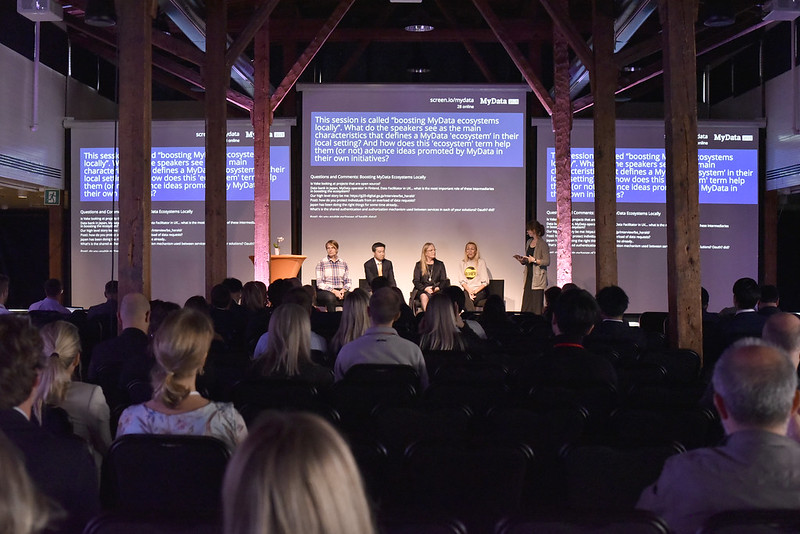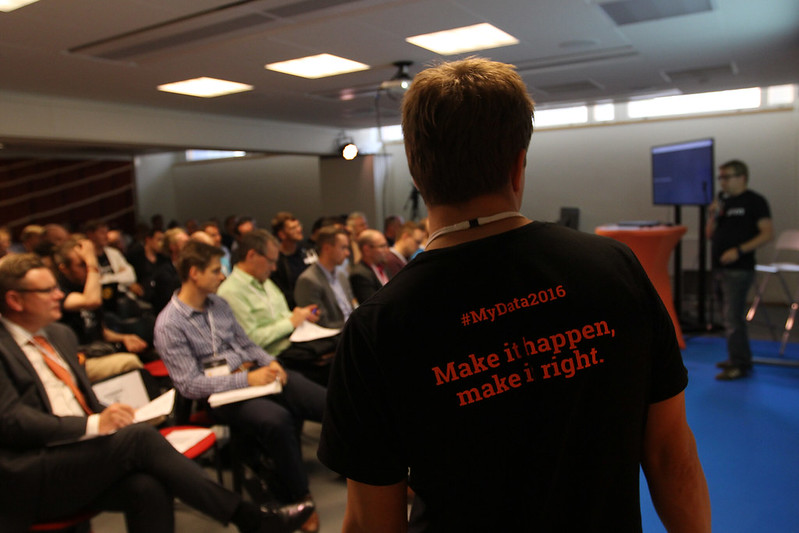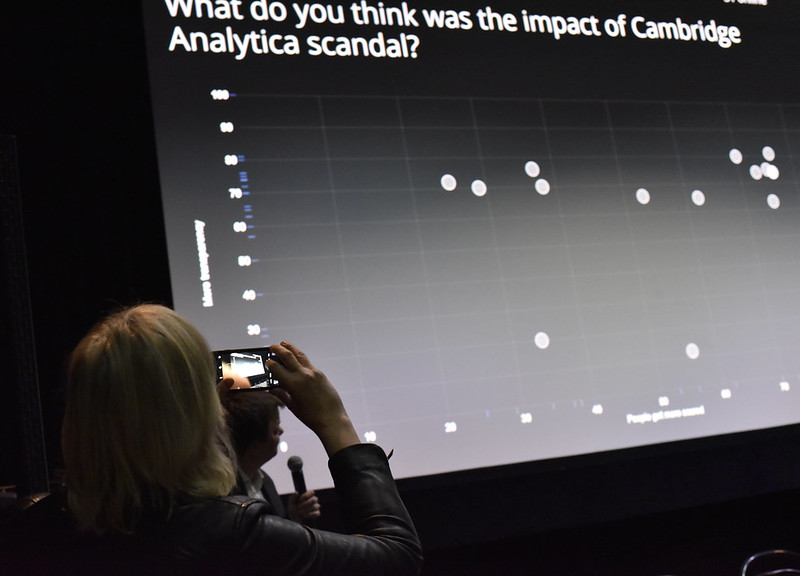The European data strategy is all about YOU
MyData Global’s comment on the European data strategy released 19 February 2020
“In a society where individuals will generate ever increasing amounts of data, the way in which the data are collected and used must place the interests of the individual first, in accordance with European values, fundamental rights and rules.” A European strategy for data, p. 1
The European Commission’s publication of its data strategy on 19 February 2020 is causing a stir, as it should. It’s a bold statement of European, human-centric values and the opportunities they afford for the citizens and societies of the EU and beyond in the present age of data.
And above all, it’s all about you. The mere 34 pages of the strategy mention the individual, human, person (or personal) a total of 65 times – that’s practically twice on every page. While the recommendations may seem somewhat removed from the average citizen, as they fall within the two main channels the European Commission has for action, policymaking and funding, the overall message should hit home for every citizen: this is about making your life better. And that’s why we are hyped!
The MyData movement, mentioned on page 10 of the strategy, and MyData Global, the award-winning nonprofit organisation stewarding the movement, has been a driving force for the inclusion of the human-centric agenda in Europe and beyond for years. In short, this human-centric paradigm aims at a fair, sustainable, and prosperous digital society, where the sharing of personal data is based on trust as well as balanced and fair relationship between individuals and organisations.
Our stated purpose is to empower individuals by improving their right to self-determination regarding their personal data and we recently published our strategy for achieving our goal of a fair, sustainable, and prosperous digital society. In what follows, we will describe in short the EU data strategy and how our mission and work aligns with the principles and proposals put forth in the EU data strategy and how all this will work together to make the lives of you and yours better.
Setting the scene: The time for action is now
“The winners of today will not necessarily be the winners of tomorrow.” p. 3
It’s clearly recognised and often written about (i.a., World Economic Forum, Financial Times) that today, Europe and Europeans are behind competitors to the east and west when it comes to benefitting from data. The pervasive sense of urgency throughout the strategy paper highlights the Commission’s keen awareness of this. So how to seize the moment and not only catch up but become the frontrunners in Europe? As was highlighted already as the slogan for the MyData 2018 conference: “From Vision to Action: The Future Is Now”. So let’s have a look at the vision described in the data strategy.
The vision: A European data space
“The Commission’s vision stems from European values and fundamental rights and the conviction that the human being is and should remain at the centre” p. 4
The crown jewel of the EU data strategy is the proposal to create a single European data space, where all data is dealt with in accordance with European rules and values. In this space, your personal and confidential data is secure while high-quality data is available for European actors (governmental and commercial), and those who share Europe’s values, for creating and innovating better services and products for you. To create this space, the European Commission will both enact fit-for-purpose legislation and make significant investments through its funding instruments.
The problems and how we’re dealing with them
“Data is created by society and can serve to combat emergencies, such as floods and wildfires, to ensure that people can live longer and healthier lives, to improve public services, and to tackle environmental degradation and climate change, and, where necessary and proportionate, to ensure more efficient fight against crime. ” p. 6
The Commission identifies eight areas where progress together is needed. (p. 6-7.) The key goals and actions outlined in MyData Global’s strategic Theory of Change corresponding to these issues are listed below, as well as what they mean for you.
Open and collapse the sections by clicking/tapping the title
Availability of data
MyData goal: Shift from closed to open ecosystems.
What this means for you: More availability of data means better and more innovative services and products for you. It also helps societies to combat emergencies, improve public services, and tackle climate change together.
Imbalances in market power
MyData goal: Shift from closed to open ecosystems.
What this means for you:The balanced and fair relationship between people and organisations will result from rectifying current imbalances. The shift to open ecosystems and increased access to data also means a more level playing field for all sizes of market actors, guaranteeing a real choice between good alternatives, instead of the virtual monopolies we are stuck with today.
Data interoperability and quality
MyData goal: Leading organisations commit to a shared journey to and of interoperability.
What this means for you: Interoperability will support your opportunities to exercise your rights to data portability as well as enable better services and user experience when data from multiple sources can speak to each other. Better quality data will further enable better decision making at all levels of society.
Data governance
MyData goal: Data infrastructure and governance is de facto human-centric.
What this means for you: A human-centric paradigm for data governance guarantees that your interests and ability to affect things to do with you are always priority number one when designing and implementing data-driven solutions.
Data infrastructures and technologies
MyData goal: Real MyData use cases, examples, and products emerge.
What this means for you:The emergence and adoption of services and products designed with the human-centric, MyData approach will increase their demand and bring better alternatives to you.
Empowering individuals to exercise their rights
MyData goal: Shifts to actionable rights and to data empowerment.
What this means for you: You can feel empowered as an agent willing and effortlessly able to exercise your rights and benefit from the data you generate.
Skills and data literacy
MyData goal: MyData Publications emerge as well-known, go-to resources, and the MyData Academy educates and certifies professionals in trusted personal data management.
What this means for you: You can begin to choose companies and organisations whose product and services you use based on whether they have certified MyData professionals designing how personal data is used.
Cybersecurity
MyData goal: Trust and empowerment increase with collective safeguards.
What this means for you: You can trust that personal data about you and yours is secure at all times.
The Strategy: Four lines of action

The data strategy is built along four lines of action. The first three together address the need for a horizontal framework for data and its governance (A & B) as well as the need for skills development in Europe (C), while the fourth, (D), proposes vertical data spaces in key sectors as a first step towards the shared, single data space that is the strategy’s goal.
A. A cross-sectoral governance framework for data access and use
While the overarching goal is that of a single data space, the strategy talks about multiple ecosystems of data within it. For this, the Commission proposes an enabling legislative framework and as a part of that framework, we are delighted to see the proposal of a Data Act (scheduled for 2021), which would take as a principle to facilitate voluntary data sharing. Further, the Commission will consider how best to address more systemic issues related to platforms and data to ensure that markets stay open and fair.
This principle of encouraging data sharing and the need to progress toward more open and fair markets are enthusiastically supported by MyData Global and we continue to work towards the same goals. In addition to the Commission’s efforts on the legislative side, the MyData community seeks to complement these developments by bringing together also developers of new and ethical business models for personal data use, technologists enabling the practical implementation of these efforts, as well as policymakers at all levels of society together with social scientists who work on cultural and societal effects of the proposed legislative matters for people and communities. We believe the full stack of business, legal, tech, and society needs to work together for our shared vision of a fair, sustainable, and prosperous digital society for all, including you.
B. Enablers: Investments in data and strengthening Europe’s capabilities and infrastructures for hosting, processing and using data, interoperability
In this line of action, which provides for funding and investment into data standards, tools and infrastructures, we are pleased to see the emphasis on support for privacy-preserving technologies and technologies underpinning personal data spaces, which are more elaborated on in the following line of action. This line also describes an investment in access to competitive, secure, and fair European cloud services as well as supporting the development of pan-European collaboration on data-sharing initiatives. We applaud the focus on fostering collaborations, as we believe it is essential to the success of the human-centric paradigm that actors collaborate on all levels: locally, regionally, and internationally.
C. Competences: Empowering individuals, investing in skills and in SMEs
This line of action is especially relevant to the work that the MyData movement and community have been engaged in for years. We applaud the key goal of individual empowerment, one of the three major shifts described already in the MyData Declaration of 2017. While we believe the enforcement of legislation such as the General Data Protection Regulation (GDPR) and the individual rights there described is the duty of the regulator, the exercising of these rights by people is of fundamental value for a fair digital society.
The Commission’s strategy astutely points out the lack of simple and easy to use tools that empower individuals to exercise their data rights. The MyData community has been actively bringing together start-ups and scale-ups across Europe in bridging this gap, encouraging active knowledge sharing and promoting coopetition across the member companies, hoping to formulate a viable model for both organisations and individuals.
To this end, we are also very excited and pleased to see the inclusion of “personal data spaces” and the plans to consider rules for providers of such spaces which would guarantee their role as neutral brokers. The MyData community envisioned a similar role in the personal data ecosystem when it described the MyData operator in the MyData Declaration and active development is currently underway to provide an architectural model for how an operator model could work from business, legal, tech, and societal perspectives.
Further, we agree with the Commission assessment that an investment in data skills in the European workforce is critically needed. To help address this issue, MyData Global published, as part of its strategy for the coming years, an ambitious new initiative for training professionals in trusted personal data management, with the working title MyData Academy. Trained professionals in organisations who work with personal data will serve as an assurance to their customers and stakeholders, that personal data is managed responsibly and its use is designed with human-centric principles at the forefront.
D. Common European data spaces in strategic sectors and domains of public interest
As a first step towards a single European data space, and to complement the development of the horizontal framework described in previous lines of action, the Commission proposes the following vertical, or sectoral, data spaces: industrial, green, mobility, health, financial, energy, agriculture, public administration, and skills. Many of these sectors touch the everyday lives of citizens and shared data spaces crossing locations and connecting individual actors within these sectors have significant potential to better your life and help you make better decisions.
“The Commission will be particularly vigilant to protect and assert the rights, obligations and interests of Europeans and companies, in particular as regards data protection, security and fair and trustworthy market practices.”
The Conclusion: what we can do together, for you and for us all

In the end, this EU strategy is about you, me, and our communities living better lives. We at MyData Global encourage the European Commission seriously to study and further embrace placing the individual in control of the data about them. The strategy now presented is a very encouraging step in this direction of creating incentives and tools for both companies and individuals to transform existing business models into truly human-centric ones, and pushing for the genuinely ethical use and development of technologies, through enabling legislation and investment. Ultimately, what is needed is a paradigm shift, not merely a modification of the old. We believe the MyData model can become the new norm globally.
Our vision is a human-centric and ethical approach to personal data, which aims at a far, sustainable, and prosperous digital society for all. In this society, people get value from their data and set the agenda on how their data is used. In this society, the ethical use of personal data is always the most attractive course of action for organisations. We are excited to see significant alignment between the EU data strategy, our plans and, most importantly, our vision.
Some of the immediate actions we are working on in the next 6-8 months:
- MyData operator white paper (3-4/2020), presenting in more detail how we respond to the call for infrastructure which the strategy calls “personal data spaces”.
- MyData case library (H2/2020), build an interactive, constantly evolving and hence sustainable repository for different examples of how MyData is applied across the world.
- Policy suggestions for the data strategy (H1/2020), suggesting measures to be taken to implement the data strategy, in a human-centric way.
- Workshops and pilots to build the “A New Governance” initiative (2020), shaping a governance body that is an independent and international standard supporting organisation (SSO) where member organizations share and define technological terminologies, standards and guidelines in the purpose of allowing the free flow of data under the individual’s control.
- MyData Europe 2020 conference in September in Berlin (9/2020) / POSTPONED DUE TO THE COVID-2019 PANDEMIC
- Development of MyData Academy (2020), a certification and training programme that is especially targeted to adult professionals and focuses on enterprise personal data management.
To do these things, we want to collaborate with you
- Sign the MyData Declaration. Who will be signatory number 1000?
- Engage with the lively community discussions on Slack – with over 1800 experts from across the world!
- Join MyData Global. Let’s celebrate the EU Data Strategy by reaching our goal of growing to 800 individual and 100 organisation members! Join the global crowd of changemakers working towards human-centric data economy.
- Read the MyData White Paper (new white papers on specific topics coming up…!)
- Read our Medium posts and previous Blog posts
- Follow us on Twitter, Facebook, LinkedIn and YouTube – in YouTube you can also re-enjoy most of the sessions of the past conferences!
Get in touch with us at hello(at)mydata(dot)org



Pingback : The online MyData community meeting for extraordinary times had +100 participants! – MyData.org
Pingback : Press release: MyData takes an important step towards open personal data ecosystems – MyData.org
Pingback : COVID-19 affects MyData Global – we need your support now more than ever – MyData.org
Pingback : Towards interconnected and human-centric data intermediaries - MyData.org
Pingback : MyData Global adopts an updated logo and visual identity